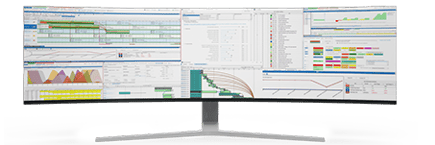Path to Sustainable Production: Carbon Footprint Measurement
The pursuit of sustainability has emerged as a critical imperative for businesses across all sectors. Nowhere is this more evident than in the pharmaceutical industry, where the demand for ethical, environmentally conscious practices is driving transformative change.
As a Production Planner in a pharmaceutical manufacturing facility, you're at the forefront of this movement, tasked with orchestrating operations that not only optimize efficiency and productivity but also minimize environmental impact.
One of the most pressing challenges facing production planners today is the measurement and reduction of carbon footprints within manufacturing processes. With growing awareness of climate change and its far-reaching consequences, stakeholders are increasingly scrutinizing the environmental footprint of pharmaceutical products.
In response, companies are under mounting pressure to adopt sustainable practices throughout their supply chains, from sourcing raw materials to distribution and beyond.
In this blog, we'll explore the significance of carbon footprint measurement in production planning within the pharmaceutical industry. We'll look into the strategies and tools available to production planners, including the integration between PlanetTogether, a leading production planning software, and enterprise resource planning (ERP), supply chain management (SCM), and manufacturing execution systems (MES) such as SAP, Oracle, Microsoft, Kinaxis, and Aveva.
By harnessing the power of these integrated systems, production planners can unlock new opportunities to enhance sustainability and drive meaningful change.

Understanding the Carbon Footprint
Before we look into the intricacies of production planning, let's first establish a clear understanding of what constitutes a carbon footprint. Simply put, a carbon footprint measures the total amount of greenhouse gases (GHGs) emitted directly or indirectly by human activities, expressed in equivalent tons of carbon dioxide (CO2). In the context of pharmaceutical manufacturing, this encompasses emissions generated throughout the entire product lifecycle, including:
Raw Material Sourcing: Extraction, processing, and transportation of raw materials, such as active pharmaceutical ingredients (APIs) and excipients.
Manufacturing Processes: Energy consumption, chemical reactions, and waste generation during drug synthesis, formulation, and packaging.
Logistics and Distribution: Transportation of finished products to distribution centers, wholesalers, pharmacies, and ultimately, end-users.
End-of-Life Disposal: Disposal methods for expired or unused pharmaceuticals, including incineration, landfill, or recycling.
By quantifying these emissions, pharmaceutical companies can identify hotspots within their operations and implement targeted strategies to mitigate their environmental impact.
The Role of Production Planning
Production planning plays a pivotal role in shaping the environmental footprint of pharmaceutical manufacturing. By optimizing production schedules, resource allocation, and inventory management, production planners can minimize waste, reduce energy consumption, and lower emissions. However, achieving these objectives requires a comprehensive understanding of the interplay between production processes, supply chain dynamics, and environmental considerations.


Leveraging Integrated Systems
To effectively integrate sustainability into production planning, pharmaceutical companies can leverage advanced software solutions such as PlanetTogether, in conjunction with ERP, SCM, and MES systems.
These integrated platforms facilitate seamless data exchange, enabling production planners to access real-time information across the entire value chain. Moreover, they provide robust analytical tools for assessing environmental performance and identifying opportunities for improvement.
Integration with SAP
SAP, a global leader in ERP software, offers a range of modules tailored to the pharmaceutical industry, including SAP S/4HANA for Pharmaceuticals.
By integrating PlanetTogether with SAP ERP, production planners can synchronize production schedules with demand forecasts, inventory levels, and resource availability. This alignment not only enhances operational efficiency but also enables proactive carbon footprint management by optimizing resource utilization and minimizing waste.
Integration with Oracle
Oracle's comprehensive suite of SCM solutions empowers pharmaceutical companies to streamline supply chain operations and adapt to changing market dynamics.
By integrating PlanetTogether with Oracle SCM Cloud, production planners can optimize production plans based on real-time demand signals, inventory visibility, and supplier performance. This synchronization enables agile decision-making and facilitates the implementation of sustainable practices, such as just-in-time manufacturing and supplier collaboration.
Integration with Microsoft Dynamics
Microsoft Dynamics offers a flexible and scalable ERP platform that caters to the unique needs of pharmaceutical manufacturers.
By integrating PlanetTogether with Microsoft Dynamics 365 Supply Chain Management, production planners can leverage advanced analytics and AI-driven insights to optimize production schedules and minimize carbon emissions. This integration enables proactive risk management and enables companies to align production activities with sustainability goals.
Integration with Kinaxis
Kinaxis RapidResponse provides end-to-end supply chain planning capabilities, enabling pharmaceutical companies to achieve agility and resilience in their operations.
By integrating PlanetTogether with Kinaxis RapidResponse, production planners can synchronize production schedules with demand fluctuations, supply chain disruptions, and regulatory requirements. This alignment enhances responsiveness and enables companies to mitigate environmental risks while optimizing resource utilization.
Integration with Aveva
Aveva offers MES solutions designed to optimize manufacturing operations and improve efficiency across the production lifecycle.
By integrating PlanetTogether with Aveva MES, production planners can achieve greater visibility and control over shop floor activities, from production scheduling to quality management. This integration enables real-time monitoring of environmental performance metrics, such as energy consumption and emissions, allowing companies to identify opportunities for improvement and drive continuous optimization.
Carbon footprint measurement is a critical aspect of production planning in the pharmaceutical industry, with far-reaching implications for sustainability and corporate responsibility. By leveraging integrated systems such as PlanetTogether, SAP, Oracle, Microsoft, Kinaxis, and Aveva, production planners can align operational excellence with environmental stewardship, driving positive outcomes for both the planet and the bottom line.
As we continue to navigate the complexities of modern manufacturing, the integration of sustainability into production planning will remain an essential priority, shaping the future of the pharmaceutical industry for generations to come.
Are you ready to take your manufacturing operations to the next level? Contact us today to learn more about how PlanetTogether can help you achieve your goals and drive success in your industry.

